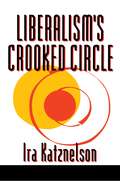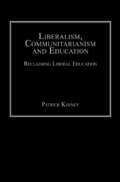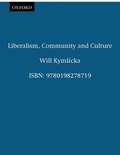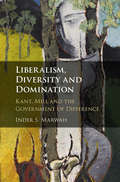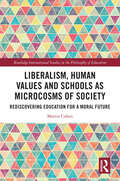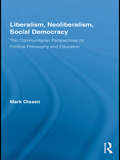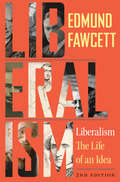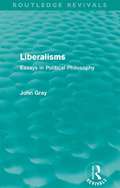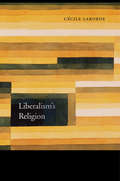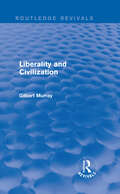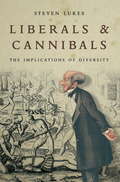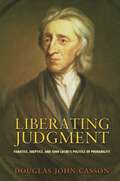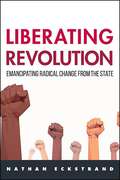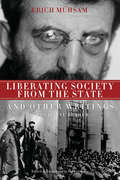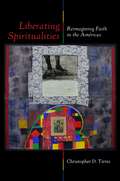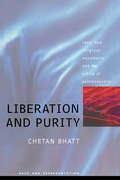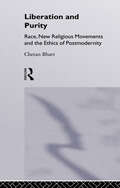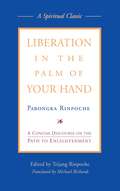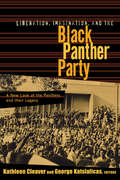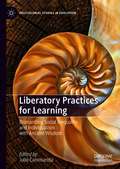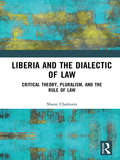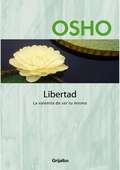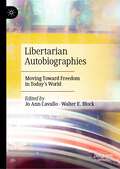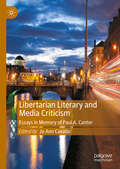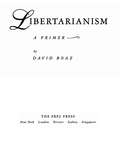- Table View
- List View
Liberalism's Crooked Circle: Letters to Adam Michnik
by Ira KatznelsonThis book is a profoundly moving and analytically incisive attempt to shift the terms of discussion in American politics. It speaks to the intellectual and political weaknesses within the liberal tradition that have put the United States at the mercy of libertarian, authoritarian populist, nakedly racist, and traditionalist elitist versions of the right-wing; and it seeks to identify resources that can move the left away from the stunned intellectual incoherence with which it has met the death of Bolshevism. In Ira Katznelson's view, Americans are squandering a tremendous ethical and political opportunity to redefine and reorient the liberal tradition. In an opening essay and two remarkable letters addressed to Adam Michnik, who is arguably East Europe's emblematic democratic intellectual, Katznelson seeks to recover this possibility. By examining issues that once occupied Michnik's fellow dissidents in the Warsaw group known as the Crooked Circle, Katznelson brings a fresh realism to old ideals and posits a liberalism that "stares hard" at cruelty, suffering, coercion, and tyrannical abuses of state power. Like the members of Michnik's club, he recognizes that the circumference of liberalism's circle never runs smooth and that tolerance requires extremely difficult judgments. Katznelson's first letter explores how the virtues of socialism, including its moral stand on social justice, can be related to liberalism while overcoming debilitating aspects of the socialist inheritance. The second asks whether liberalism can recognize, appreciate, and manage human difference. Situated in the lineage of efforts by Richard Hofstadter, C. Wright Mills, and Lionel Trilling to "thicken" liberalism, these letters also draw on personal experience in the radical politics of the 1960s and in the dissident culture of East and Central Europe in the years immediately preceding communism's demise. Liberalism's Crooked Circle could help foster a substantive debate in the American elections of 1996 and determine the contents of that desperately needed discussion.
Liberalism, Communitarianism and Education: Reclaiming Liberal Education
by Patrick KeeneyCommunitarian thinkers have identified important deficiencies in liberal thought, in particular the limits of the account of justice given in liberal theories. This book makes transparent for the reader the implications that the liberal account of justice has for our ways of thinking about education. Citing the work of John Rawls as the principal expression of contemporary liberal thought, Keeney argues that there are certain intractable tensions between the view of the individual given in rights-based theories of justice and a certain valuable conception of education, which in the West has traditionally been termed a "liberal" or "general" education and concludes that ideals of a liberal education are only available to a political ethic which is capable of articulating a public conception of virtue and the good.
Liberalism, Community and Culture
by Will KymlickaLiberalism is often described as a theory about the proper relationship between the individual and the state, but it also contains a broader account of the relationship between the individual and society. This book presents the liberal view about the nature and value of community and culturein an unusually explicit and systematic way, and links it to more familiar liberal views on individual rights and state neutrality.
Liberalism, Diversity and Domination: Kant, Mill and the Government of Difference
by Inder S. MarwahThis study addresses the complex and often fractious relationship between liberal political theory and difference by examining how distinctive liberalisms respond to human diversity. Drawing on published and unpublished writings, private correspondence and lecture notes, the study offers comprehensive reconstructions of Immanuel Kant's and John Stuart Mill's treatment of racial, cultural, gender-based and class-based difference to understand how two leading figures reacted to pluralism, and what contemporary readers might draw from them. The book mounts a qualified defence of Millian liberalism against Kantianism's predominance in contemporary liberal political philosophy, and resists liberalism's implicit association with imperialist domination by showing different divergent responses to diversity. Here are two distinctive liberal visions of moral and political life.
Liberalism, Human Values and Schools as Microcosms of Society: Rediscovering Education for a Moral Future (Routledge International Studies in the Philosophy of Education)
by Martin CohenThis seminal volume provides an accessible overview of key ethical and philosophical debates surrounding contemporary education policy, advocating for a future in education that is primarily driven by prioritising social values.Grounded in the educational ideas of recent British liberal and philosophical thinkers, including Roger Scruton, Mary Midgley and Brenda Almond in particular, the book provides a deeper understanding of the importance of intellectual and moral freedom as it plays out in today’s schools. The book echoes Almond’s call for education to be viewed through the lens of social values and argues for a broader societal strategy to the philosophy of education than narrowly utilitarian attempts to prepare pupils for the labour market. Chapters present various debates in society that relate to liberalism, social values and utilitarianism, and ultimately encourage dialogue on the approach towards education that is necessary to create a socially adjusted, thoughtful and genuinely knowledgeable society of the future.By encouraging readers to think about the requirements of the schools of tomorrow along with their role in shaping both individual lives and society itself, this book will be of interest to scholars, postgraduate students and researchers in the fields of philosophy of education, education studies and moral and value education. Those interested in the sociology of education and citizenship studies more broadly will also benefit from the volume.
Liberalism, Neoliberalism, Social Democracy: Thin Communitarian Perspectives on Political Philosophy and Education (Routledge Studies in Social and Political Thought)
by Mark OlssenThe Credit Crunch of 2008 has exposed the fallacies of neoliberalism and its thesis of the self-regulating market, which has been ascendant in both economic theory and policy over the last 30 years. In moving beyond neoliberalism, social democratic arguments are once again coming to the fore; however, in the context of the 21st century, they will need to be theorized in relation to new global concerns. This book critically revisits the core theses of liberalism and neoliberalism that have provided philosophical support to free market economics - as enunciated in the writings of liberal political philosophers such as Friedrich von Hayek, Karl Popper and Isaiah Berlin - and seeks to expose the deficiencies of their beliefs that became hegemonic from the 1970s until the first decades of the present century. In moving beyond the formulas and mantras of liberalism, the book seeks to re-theorize social democracy and articulate a new vision of the political arrangements needed for the 21st century by reconsidering issues such as liberty, autonomy, social dependence and multiculturalism.
Liberalism: The Life of an Idea Second Edition, Second Edition
by Edmund FawcettDespite playing a decisive role in shaping the past two hundred years of American and European politics, liberalism is no longer the dominant force it once was. In this expanded and updated edition of what has become a classic history of liberalism, Edmund Fawcett traces its ideals, successes, and failures through the lives and ideas of exemplary thinkers and politicians from the early nineteenth century to today. Significant revisions--including a new conclusion--reflect recent changes affecting the world political order that many see as presenting new and very potent threats to the survival of liberal democracy as we know it. A richly detailed account of a vulnerable but critically important political creed, this book reminds us that to defend liberalism it is vital to understand its character and history.
Liberalisms: Essays in Political Philosophy (Routledge Revivals)
by John GrayLiberalisms, a work first published in 1989, provides a coherent and comprehensive analytical guide to liberal thinking over the past century and considers the dominance of liberal thought in Anglo-American political philosophy over the past 20 years. John Gray assesses the work of all the major liberal political philosophers including J. S. Mill, Herbert Spencer, Karl Popper, F. A Hayek, John Rawls and Robert Nozick, and explores their mutual connections and differences.
Liberalism’s Religion
by Cécile LabordeCécile Laborde argues that religion is more than a statement of belief or a moral code. It refers to comprehensive ways of life, theories of justice, modes of association, and vulnerable collective identities. By disaggregating these dimensions, she addresses questions about whether Western secularism and religion can be applied more universally.
Liberality and Civilization: Lectures Given At The Invitation Of The Hibbert Trustees In The Universities Of Bristol, Glasgow And Birmingham (Routledge Revivals)
by Gilbert MurrayFirst published in 1938, these lectures argue that liberality is the foundation of civilization. According to Gilbert Murray, civilization provides the surplus of security, leisure and wealth that makes liberality possible; a failure of liberality is the surest test of the failure of a civilization. This is a fascinating reissue that will be of great value to students with an interest in political philosophy and the foundations of liberal society.
Liberals and Cannibals: The Implications of Diversity
by Steven LukesWith debates on the meaning of 'liberal society' more heated than ever, this is a timely re-issue of a classic textCan the tension between relativism and the moral universalism current in contemporary politics be resolved within the framework of liberalism? How is liberal society to interpret the diversity of morals? Is pluralism the appropriate response? How does pluralism differ from the widely condemned ethnocentric relativism -'liberalism for the Liberals, cannibalism for the cannibals'?Confronting liberal thought with its own limitations, Steven Lukes' work is more relevant than ever. While recognizing the dangers of moral imperialism, Lukes argues that a relativist position based on identifying clearly distinct cultural and moral communities is incoherent. Drawing on work in anthropology and philosophy, he examines the nature of social justice, the politics of identity and human rights theory.From the Trade Paperback edition.
Liberating Judgment: Fanatics, Skeptics, and John Locke's Politics of Probability
by Douglas John CassonExamining the social and political upheavals that characterized the collapse of public judgment in early modern Europe, Liberating Judgment offers a unique account of the achievement of liberal democracy and self-government. The book argues that the work of John Locke instills a civic judgment that avoids the excesses of corrosive skepticism and dogmatic fanaticism, which lead to either political acquiescence or irresolvable conflict. Locke changes the way political power is assessed by replacing deteriorating vocabularies of legitimacy with a new language of justification informed by a conception of probability. For Locke, the coherence and viability of liberal self-government rests not on unassailable principles or institutions, but on the capacity of citizens to embrace probable judgment. The book explores the breakdown of the medieval understanding of knowledge and opinion, and considers how Montaigne's skepticism and Descartes' rationalism--interconnected responses to the crisis--involved a pragmatic submission to absolute rule. Locke endorses this response early on, but moves away from it when he encounters a notion of reasonableness based on probable judgment. In his mature writings, Locke instructs his readers to govern their faculties and intellectual yearnings in accordance with this new standard as well as a vocabulary of justification that might cultivate a self-government of free and equal individuals. The success of Locke's arguments depends upon citizens' willingness to take up the labor of judgment in situations where absolute certainty cannot be achieved.
Liberating Revolution: Emancipating Radical Change from the State (SUNY series in New Political Science)
by Nathan EckstrandLiberating Revolution challenges the idea that we understand what revolution is. All current understandings of revolution are different ways of portraying the state. To liberate revolution, we must explain radical change without determining its course or limiting what it can do. Nathan Eckstrand reviews earlier theories of revolution from history—social contract theory, Marxism, Hegelianism, liberalism, communism, totalitarianism, and Machiavellism—and studies how they describe political change. He then puts forth a new theory of change called Dynamic Anarchism, drawing on Event Ontology's discussions of radical change, systems theory's understanding of dynamic and adaptive systems, and anarchism's attempts to think of politics independent of the state. In its final chapter, Liberating Revolution advises how to produce radical change effectively. A valuable contribution to the ongoing discussion of how best to understand change given discoveries both microscopic and global, this book offers useful ideas to students curious about why revolutions often fail to achieve their goals or to anyone learning how change is depicted in political theory.
Liberating Society from the State and Other Writings: A Political Reader
by Erich MühsamFeaturing a riveting collection of anarcho-communist poetry, essays, articles, and diary entries, this translation of Erich Mühsam's legendary writings introduces the German revolutionary's ideas to English speakers for the first time. Uniting a burning desire for individual liberation with radical, left-wing convictions and bohemian strains with syndicalist tendencies, this diverse body of work not only includes his main political pamphlet and one of the key texts in the history of German anarchism but also some of his best-known poems, unbending defenses of political prisoners, passionate calls for solidarity among the proletariat, recollections of the utopian community of Monte Verità, debates on the rights of homosexuals and women, and the role of intellectuals in the class struggle. Perfect for anarchists, activists, or those interested in German history, this expansive and enlightening compilation provides a deep understanding of this important historical figure.
Liberating Spiritualities: Reimagining Faith in the Américas
by Christopher D. TirresA new perspective on spirituality and social change as seen through the work of six visionary thinkersIn Liberating Spiritualities, Christopher D. Tirres offers an in-depth exploration of spirituality as a catalyst for social transformation, showcasing the profound insights of six distinguished twentieth-century liberation thinkers from across the Américas. This thought-provoking work examines the contributions of Marxist philosopher José Carlos Mariátegui, renowned educator and philosopher Paulo Freire, innovative constructive theologian Virgilio Elizondo, influential cultural and feminist theorist Gloria Anzaldúa, activist mujerista theologian and social ethicist Ada María Isasi-Díaz, and groundbreaking ecofeminist theologian Ivone Gebara. Tirres examines the distinct yet interconnected philosophies of these figures, showcasing their unified critique of colonial Christendom and their deep commitment to the marginalized. He adeptly articulates how their diverse religious and philosophical backgrounds come together in a shared vision of spirituality as a fundamental aspect of human life and intelligence. He further illuminates how these thinkers advocate for spirituality as a non-reductive, life-affirming practice, transcending traditional boundaries and offering an integrated approach to faith, culture, and social justice. Their collective insights form a persuasive case for re-envisioning spirituality as a crucial element in the quest for a more just and compassionate world.Liberating Spiritualities is not only a tribute to these six influential figures but also a critical reflection on the relevance of their ideas in today’s global context. Tirres’s transdisciplinary study bridges liberationist and pragmatic insights, offering readers a fresh, highly original interpretation of socially engaged spirituality, making this book an essential resource for those seeking to understand the transformative power of spirituality in the pursuit of social justice and human dignity.
Liberation And Purity: Race, Religious Movements And The Ethics Of Postmodernity
by Bhatt, Chetan Chetan Bhatt University of Southampton.First published in 1997. Routledge is an imprint of Taylor & Francis, an informa company.
Liberation and Purity: Race, New Religious Movements and the Ethics of Postmodernity
by Chetan BhattFirst published in 1997. The rise of new religious movements has raised important questions about how race, ethnicity and the lives of black minority communities in the West are to be understood. In Liberation and purity, Chetan Bhatt critically examines the ideas and organization of new Hindu and Islamic movements and relates this to contemporary debates in philosophy, social theory and cultural studies. He considers the creation of new traditions and new ethnicities by these movements and explores how ideas of purity, pollution, the body, sexuality and gender are key themes in their ideas of emancipation. Bhatt explores the relationship between right-wing and progressive social movements in modern civil societies, and examines the influence on these movements of new globally-organized communications technologies.
Liberation in the Palm of Your Hand: A Concise Discourse on the Path to Enlightenment (Tibetan Buddhism Ser.)
by Michael Richards Trijang Rinpoche Pabongka RinpochePabongka Rinpoche was one the twentieth century's most charismatic and revered Tibetan lamas, and in Liberation in the Palm of Your Hand we can see why. In this famous twenty-four-day teaching on the lamrim, or stages of the path, Pabongka Rinpoche weaves together lively stories and quotations with frank observations and practical advice to move readers step by step along the journey to buddhahood. When his student Trijang Rinpoche first edited and published these teachings in Tibetan, an instant classic was born. The flavor and immediacy of the original Tibetan are preserved in Michael Richards' fluid and lively translation, which is now substantially revised in this new edition.
Liberation, Imagination and the Black Panther Party: A New Look at the Black Panthers and their Legacy (New Political Science Reader)
by Kathleen Cleaver George KatsiaficasThis fascinating book gathers reflections by scholars and activists who consider the impact of the Black Panther Party, the BBP, the most significant revolutionary organization in the later 20th century.
Liberatory Practices for Learning: Dismantling Social Inequality and Individualism with Ancient Wisdom (Postcolonial Studies in Education)
by Julio CammarotaThis book promotes collaborative ways of knowing and group accountability in learning processes to counteract the damaging effects of neoliberal individualism prevalent in educational systems today. These neoliberalist hierarchies imposed through traditional, autocratic knowledge systems have driven much of the United States’ educational policies and reforms, including STEM, high stakes testing, individual-based accountability, hierarchical grading systems, and ability grouping tracks. The net effect of such policies and reforms is an education system that perpetuates social inequalities linked with race, class, gender, and sexuality. Instead, the author suggests that accountability pushes past individualism in education by highlighting democratic methods to produce a collective good as opposed to a narrow personal success. In this democratic model, participants contribute to the common goal of elevating the entire group. Drawing from a well of creative praxes, reflexivity, and spiritual engagement, contributors incorporate collective dreaming to envision alternate realities of learning and schooling and summon the spirit into action for change.
Liberia and the Dialectic of Law: Critical Theory, Pluralism, and the Rule of Law
by Shane ChalmersIt is the condition of modernity that an institution cannot depend on a god, tradition, or any other transcendental source to secure its foundations, which thereby come to rest upon – or rather in, and through – its subjects. Never wholly separated from its subjects, and yet never identical with them: this contradictory condition provides a way of seeing how modern law gives form to life, and how law takes form, enlivened by its subjects. By driving Theodor Adorno’s dialectical philosophy into the concept of law, the book shows how this contradictory condition enables law to become instituted in ways that are hostile to its subjects, but also how law remains open to its subjects, and thus disposed towards transformation. To flesh out an understanding of this contradiction, the book examines the making and remaking of “Liberia”, from its conception as an idea of liberty at the beginning of the nineteenth century to its reconstruction at the beginning of the twenty-first with the assistance of an international intervention to “establish a state based on the rule of law”. In so doing, the book shows how law is at the epicentre of a colonising power in Liberia that renders subjects as mere objects; but at the same time, the book exposes the instability of this power, by showing how law is also enlivened by its subjects as it takes form in and through their lives and interactions. It is this fundamentally contradictory condition of law that ultimately denies power any absolute hold, leaving law open to the self-expression of its subjects.
Libertad
by Osho OshoIdentifica y supera los obstáculos que encuentres en el camino hacia tu libertad. En Libertad Osho define tres estadios: El primero es la «libertad de», una libertad que procede de la ruptura de la «esclavitud psicológica» impuesta por las fuerzas externas como la familia o la religión. El segundo es la «libertad para», una libertad que deriva de una actitud o circunstancia de signo positivo (un abrazo, la creaciónde algo, una relación que nos llena o una visión artística o humanitaria). El tercero y último es la «libertad simple», la más elevada y primordial. Se trata, en realidad, de la libertad de ser simplemente uno mismo y responder sinceramente a cada requerimiento de la vida. Osho nos invita a enfrentarnos a todo aquello que se nos plantea como un reto para, partiendo de cada uno de nosotros, crear un nuevo ser humano que sepa equilibrar la libertad con la responsabilidad y que tenga verdadera independencia de criterio, ya que la libertad verdadera es espiritual: tiene que ver con nuestro interior, puesto que éste no puede ser esposado, encarcelado ni encadenado.
Libertarian Autobiographies: Moving Toward Freedom in Today’s World
by Jo Ann Cavallo Walter E. BlockInfluential libertarians from diverse backgrounds and professions who have worked toward a freer society across the globe share their personal and intellectual journeys, including what their lives and thoughts were before they embraced libertarianism; which people, texts, or events most inspired them; what experiences, challenges, tribulations, and achievements they have had as participants or leaders in this movement, and how this philosophy has affected their private and professional lives. The volume’s 80 contributors span the political-philosophical spectrum of libertarianism, including anarcho-capitalists, minarchists, constitutionalists, classical liberals, and thick libertarians. Their essays express different perspectives on many issues even while articulating such core principles as an appreciation for individual liberty, private property rights, the rule of law, and free enterprise. Together, they represent myriad individual journeys toward libertarianism, however defined. By bringing together a range of contemporary voices from outside the dominant left-right paradigm, this book aims to contribute to the viewpoint diversity that is crucially needed in today’s public discourse. These autobiographies not only offer compelling insights into their individual authors and the state of the world today, but may also inspire the next generation to make our society a freer one.
Libertarian Literary and Media Criticism: Essays in Memory of Paul A. Cantor
by Jo Ann CavalloThis volume applies libertarian philosophy and free-market economic theory to both literature and media, from early modern drama to novels to comic books, cinema, and television series. Several chapters contrast capitalism with statism, focusing on the market economy versus central planning, freedom versus government coercion. Not surprisingly, the economic theories of Adam Smith, Ludwig von Mises, and F.A. Hayek run through several essays. Contributors also engage with other theorists and writers as diverse as Thomas Hobbes, Charles Darwin, Thomas Huxley, Friedrich Nietzsche, Leo Strauss, and Judith Butler.
Libertarianism
by David BoazTens of millions of Americans, from Generation X-ers to baby boomers and beyond, are rediscovering libertarianism, a visionary alternative to the tired party orthodoxies of left and right. In 1995 a Gallup poll found that 52 percent of Americans said "the federal government has become so large and powerful that it poses an immediate threat to the rights and freedoms of ordinary citizens." Later that year, The Wall Street Journal concurred, saying: "Because of their growing disdain for government, more and more Americans appear to be drifting-often unwittingly-toward a libertarian philosophy." Libertarianism is hardly new, but its framework for liberty under law and economic progress makes it especially suited for the dynamic new era we are now entering. In the United States, the bureaucratic leviathan is newly threatened by a resurgence of the libertarian ideas upon which the country was founded. We are witnessing a breakdown of all the cherished beliefs of the welfare-warfare state. Americans have seen the failure of big government. Now, in the 1990s, we are ready to apply the lessons of this century to make the next one the century not of the state but of the free individual. David Boaz presents the essential guidebook to the libertarian perspective, detailing its roots, central tenets, solutions to contemporary policy dilemmas, and future in American politics. He confronts head-on the tough questions frequently posed to libertarians: What about inequality? Who protects the environment? What ties people together if they are essentially self-interested? A concluding section, "Are You a Libertarian?" gives readers a chance to explore the substance of their own beliefs. Libertarianism is must reading for understanding one of the most exciting and hopeful movements of our time.
